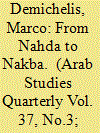|
|
|
Sort Order |
|
|
|
Items / Page
|
|
|
|
|
|
|
| Srl | Item |
| 1 |
ID:
141511


|
|
|
|
|
| Summary/Abstract |
The Governmental Arab College of Jerusalem is a little-known constructed space that emerged and then disappeared in just a few decades, a remarkable while extremely limited time if we reflect on the ancient history of the town that hosted it. However, it would be a great mistake not to consider these 30 years of history, from 1918 to 1948, and especially the wealth of cultural consciousness that the College was able to instill in its students. Ihsan Abbas (1920–2003), Ismail Ragib Khalidi (1916–1968), ‘Abdul Latif Tibawi (1910–1981), Irfan Shahid (1926) as academics, and Haidar Abdel Shafi (1919–2007), Halil-Salim Jabara (1913–1999), Hasib Sabbagh (1920–2010) etc. as politicians and activists are some of the most important names in Arab Palestinian culture and politics of the twentieth century, and all of them studied at the Arab College of Jerusalem. In this article, I would like to focus attention on the importance of this secondary/preparatory school, the social and cultural values that the teaching body was able to impart, and the role it played within the increasing and violent debate that the Arab College ignited concerning the growing Arab Palestinian-Jewish conflict in the first half of the twentieth century under the British Mandate. The Palestinian intelligentsia that was shaped within the Arab College symbolizes a cultural elite that, even if it would learn what it means to live as refugees, continued to work in different ways on its own cultural tradition. A key subject in understanding the main reasons behind the roots of identity within this divided city.
|
|
|
|
|
|
|
|
|
|
|
|
|
|
|
|
| 2 |
ID:
141513


|
|
|
|
|
| Summary/Abstract |
Throughout history and up until the middle of the twentieth century, available information about Najd, the vast central region of the present-day Saudi Arabia, had generally been scarce, especially in languages other than Arabic. Najd of the past had a unique and distinctive culture that deserves to be known in the West. This article aims at briefly examining available information concerning Najd from antiquity up until the middle of the twentieth century, showing that more than one factor participated in the shortage of information concerning Najd of the past and its culture. The objective of this article is to define the physical features of Najd in order to show how these features had participated in its external isolation and eventually the lack of information encompassing the unique culture of Najd of the past. A brief review of the history of Najd provides the necessary information on how Najd had suffered from neglect, misunderstanding, and underestimation of its culture. This article ends by referring to the fact that time, with its change of circumstances, has brought and is still bringing more on the past of Najd and its inhabitants and culture.
|
|
|
|
|
|
|
|
|
|
|
|
|
|
|
|
| 3 |
ID:
141510


|
|
|
|
|
| Summary/Abstract |
Edward Said's Orientalism through deconstructing colonial discourses of power-knowledge postulates that colonization for the colonized has a particular ontological finality, reification. I contend here that the process of subjection has a far more profound effect than merely reifying the colonized, to borrow from Anouar Abdel-Malek, as customary, passive, non-participating, and non-autonomous. Rather, Western imperial narratives and what Said calls its “evaluative judgments” and “program of actions” also come to interpellate the reified subject's cosmovision, agency, and its forms of resistance. Focusing on the Middle East, this study is a genealogy that exposes how techniques and technologies of imperial power have symbolically and materially produced the Oriental rebel in Western history. Through re-reading institutionalized knowledges and resurrecting a counter-history, this article reveals a hidden and buried discursive formation, one which I call counter-revolutionary discourse. I argue that this system of thought is built through dispersed and heterogeneous but power-laden statements from Aymeric and Comte de Volney to Napoleon Bonaparte, Ernest Renan, Gustave Le Bon, and Thomas Friedman.
|
|
|
|
|
|
|
|
|
|
|
|
|
|
|
|
| 4 |
ID:
141509


|
|
|
|
|
| Summary/Abstract |
This article proposes a framework for exploring the role of mobility in the rearticulation of agency relating to white and minority identities in poems by Lisa Suhair Majaj, Naomi Shihab Nye, and Suheir Hammad. In this context, we show how the political poetry of Majaj, Hammad, and Nye employs mobility to destabilize racialized structures and definitions underlying ethnic and white identities and challenge the invisibility of related power hierarchies and hegemonic discursive formations. Through translational representations of mobility, we argue, the poets and poetic subjects unmask racialized locations and map transformative itineraries shaped by choice and affiliation; the resulting identities are constantly negotiated and reshaped in relation to struggle, justice, and global concerns. The examination of mobility in this context also reveals the conditions of existence and circulation of white privilege to unmask its influence on ascriptions of human value and worth.
|
|
|
|
|
|
|
|
|
|
|
|
|
|
|
|
|
|
|
|
|